#well technically it was theology
Text
Throwback to that time in 9th Grade where our Lord of the Flies Socratic Seminar essentially turned into everyone else in the group grilling me on symbolism and character development because I was the only person who actually understood the book.
#lord of the flies#lotf#english class#well technically it was theology#but we read it in english#literary analysis is both a blessing and a curse
7 notes
·
View notes
Text
oh shit! i made a book.


remember back in september when i said i was going to learn bookbinding. well! weeks of trial and error later, i've finally finished my very first bind! as some of you might have seen in past posts, i decided to focus on my 90k zolu mermaid/mafia au the sea makes bones of bodies and now here we are!
the bind itself is a relatively simple 320 page cased-in flatback with a fabric spine and lotka paper covers and endsheets, but i decided to use it as a "test book" to learn a little bit of everything. so! it features hand-traced gold foil on the cover and spine, a hand-beaded bookmark tipped with a genuine shark tooth (iykyk), and what im calling "cookies and cream" speckled edges (lol)


ive posted some screenshots of the typeset already so i wont go too crazy, but im actually pretty happy with how it looked all put together!! i sewed my signatures together too tightly, i think, so it kind of wants to flop closed (rip) but i tried to take some pictures of how it turned out!
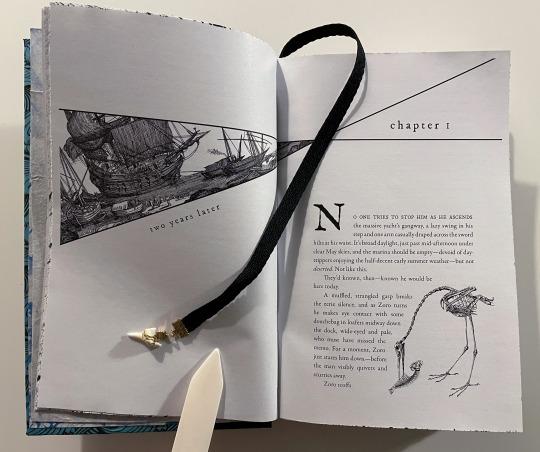

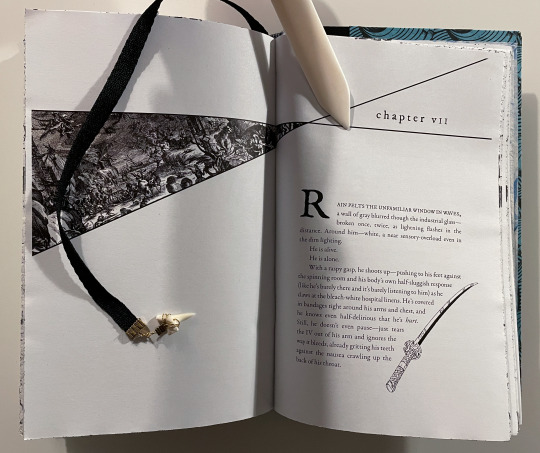
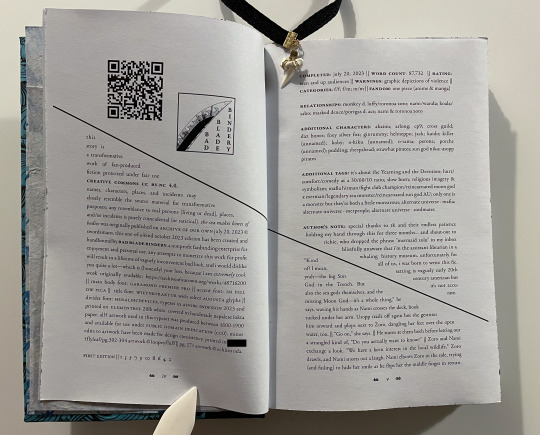





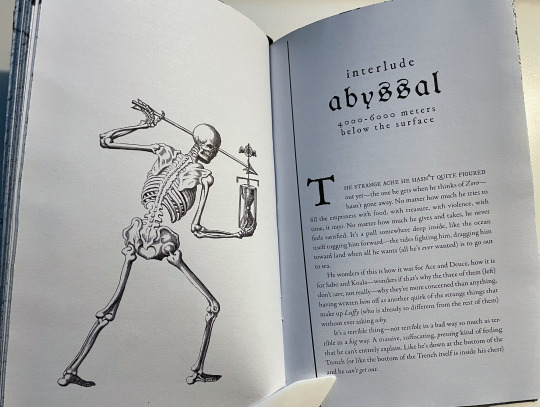
i have a ton of pictures of the text body itself (and fun things like the playlist page, the title pages, etc) but this post is already long enough, haha.
the absolute best, best, best part of this whole project was a huge, wonderful, amazing surprise from @fluffyartbl0g that brought the whole project together!!! they were sweet enough to send some incredible art (!!!!) that i sewed into the front and back!!!
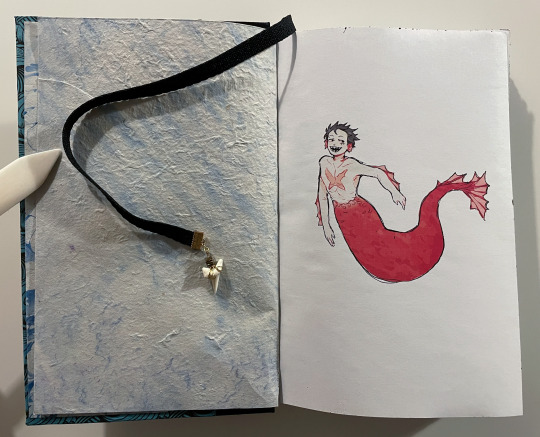
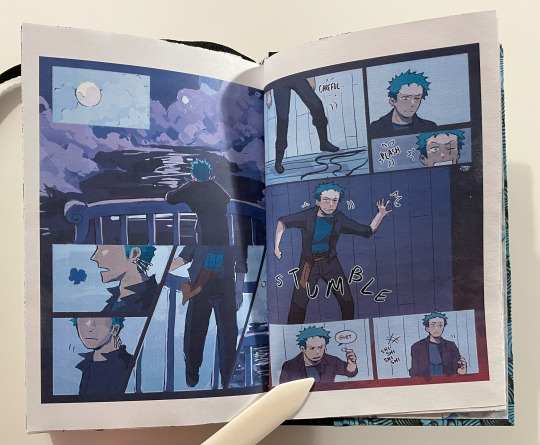

!!! AAA!!!!
overall, i learned so much and i took a ton of notes so i'll (hopefully) avoid some of my beginner mistakes when i do this again. i already have three more versions of the text block printed out and pressing right now! >:3c im going to keep practicing with this story for at least three more binds (because i want to get my technique down and i have some new ideas i want to try), and then switch to typsetting ocean theology and attempt a thinner 40k bind.
shoutout to renegade publishing for their wealth of technical help, and a big huge thank you to the dumbass zone for watching blurry videos of me flipping through printer paper at 3AM and just generally being so, so supportive while i learned all these new skills. you guys are the best!!
now... on to the next one!
EDIT: i've been asked for the typeset, so if you are interested in binding this yourself, you can find all the files here!! :D if you do make your own copy, i would love to see!!! PLEASE TAG MEEE!!!! :DDD
424 notes
·
View notes
Note
a few quick questions on Machete, what breed is he? I love the angles of his snout and the proportions remind me of a borzoi though I don't think he is one. Also, does he have a set age for when he's a cardinal? I picture him to be around mid-30s or so. Wonderful art! love your stuff and find you an inspiration :)
He's a fictional breed called Podenco Siciliano, which is closely related to modern day Ibizan Hound (pictured below) and other Mediterranean rabbit-hunting podencos. I usually just default to calling him a sighthound since he's somewhat of a provincial mongrel and not meant to be purebred anyway.


As for the age, mid-30s sounds about right. I think the current timeline goes something like this:
0 - Born to a lower-middle class family in Sicily, father is a tradesman, has three older brothers. Generally considered a runt, is weak and sick all the time, parents suspicious of his unusual colors.
3 - Gets left at a monastery and raised by monks as a foundling. Nervous and meek kid, but the monks think he's endearing and do their best to support him. Is taught to read and write, which is a massive advantage at that day and age, and learns rudimentary Latin through exposure.
9 - Apprenticed to a Neapolitan priest, moves to southern part of mainland Italy (or Kingdom of Naples as it was called, it was ruled by Spain actually). Does chores and runs errands in exchange for education and experience.
15 - The priest gets elevated to a bishop and decides to sponsor Machete's further studies at an acclaimed university in Venice (in Northern Italy). There he studies theology, medicine, arts, law, philosophy and gets fluent in Latin and adequate in Greek. Befriends Vasco but their relationship is short-lived.
21 - Ordained a priest. Leads a parish somewhere in Papal States (Central Italy). Is generally well liked but doubts his career choice from time to time.
26 - Becomes a part of the Papal Court in Vatican, mostly because of the recommendations of his former mentor and professors, good reputation, excellent track record and sheer luck. Still a priest but assists bishops, cardinals and the pope himself directly. Moves to Rome. Becomes pope's unofficial confidant due to his obedient and hardworking nature and because of his lack of prestigious family connections that would render him a threat. Slowly starts to gain wealth.
30 - Created a cardinal (which is the second highest position in the church after the pope, and it's at the sole discretion of the pope who becomes one). Is also a bishop as a technicality. Handles administrative jobs, tons of paperwork, at some point he's in charge of a lot of the political correspondence and diplomatic missions. Still the old pope's trusted advisor but disliked by the majority of the cardinals, who see him as an outsider, sycophant and a potential disruptor of the status quo.
34 - Meets Vasco again. Vasco has become a succesful politician in Florence, he's married with three children.
38 - The pope dies and Machete's status falters. He starts to work with the Roman inquisition more. Oversees trials, torture, excommunications and executions of heretics, witches and most of all, protestants (since we're reaching Counter Reformation times and the Vatican is Very Worried about the spread of Luther's ideas). Isn't having a good time at all but keeps up the appearances. Gets infamous. The beginning of the true villain era.
40 - Grows increasingly more disillusioned with life and his ideals, as well as the corruption of the Curia. Burned out, paranoid and desperate. Uses scare tactics, extortion and legal trickery to expose and undermine his enemies, but gains them faster than he can keep up. Employs spies, thugs and assassins. Feared and loathed.
43 - Gets assassinated and dies in disgrace.
#answered#jaydenchapstick#sorry this turned out sorta long#and kinda bummer too#all of this is subject to change if I end up thinking of something better#not set in stone just the current grand picture#the ages are approximate#the history of Italy and the workings of the catholic church are both such clusterfucks holy moly gosh darn#I've done research but don't rely on my word that this is all accurate and feasible in the end it's fantasy rules#whenever you see him wearing any red it's a sign he's at the cardinal phase these positions are color coded like that#Machete
880 notes
·
View notes
Note
Ok so im antichrist gideon anon my bad i only noticed this rn.
Ok so technically, from a catholic point of view, alecto technically fills more requirements for being God than John does. Most relevant for us rn, the requirement she fulfill is the tripartite god (which im unsure is actually the term in english), ie: the father, the son, and the holy spirit, or alecto, nona, earth.
What does this make John? Lucifer. John was chosen by the earth for a task because he was her specialest little guy (Angel-era) fucked up massively, destroyed the world, got humanity kicked out of "eden", and even now torments their descendants for the same reasons he did then, is, technically, a False God, and depending on which interpretation of Lucifer's actions and background you have, actually does have similar reasons to John (At least regarding rage at the unfairness, him and his buddies getting fucked up for it, his buddies becoming "demons" like him, ie necromancers. Idk if lucifer was an environmentalist.)
Now, Gideon! As we have established in this allegory John's Lucifer, she does get the Antichrist treatment automatically, but she also has ascended to a place of social prominence, her showing up as John's daughter has coincided with stuff you can technically argue sorta relates to the Armageddon (the demons being released, the war against demons, the fucking possession stuff which may qualify as a plague) and she also distracts the followers of Actual God (Get in line thou big slut), drives them to wickedness and to harm others and themselves (Harrow, lyctorhood, their rivalry, the lobotomy), but she's also necessary so people can, yknow, get into heaven and for things such as the apocalypse to happen (Protagonist— I mean her blood opens the tomb and that's needed for God Alecto to wake.)
Anyways this was prompted by me stumbling across the term Lesbian Jesus again, pausing, and asking myself "Is she, though?" Which through this very well organised essay we have determined, she is not.
Nona is the one who's lesbian jesus.
this is a GEM of a thought to receive in my inbox I'm honoured you graced me with it! the part of me who was obsessed with Paradise Lost at age 17 loves your argument for Lucifer = John.
I think TM treats catholic theology in the same way she treats most of her influences, picking and choosing what to keep so but anyway catholic lore expert @monstrousgourmandizingcats get in here. do you have thoughts 👀 🙏
176 notes
·
View notes
Text
Watching people platform and tokenize the Neturi Karta is so surreal, because, well, for starters...
Their cult's theology is such that they actually want the Palestinian and general Muslim genocide that everyone keeps fearmongering about (along with a Christian genocide and a general Jewish genocide, and pretty much a general "kill 'em all who aren't us"-cide), but they want said mass killing to be done by the Jewish Messiah as he reestablishes the Jewish kingdom--a kingdom in which the Neturi Karta will be rewarded and elevated above everyone as the "True Jews".
They're only "antizionist" on the most technical of grounds--that being that they feel it's too soon and under the wrong leadership to start the slaughter to make their perfect version of the Kingdom of Israel. (Which is why that 99+% of the rest of the Jewish population wants to have nothing to do with them).
Oh, and they're also Holocaust Deniers--not because they deny the Holocaust happened, they just deny the Jewishness of the victims. Because, to their mind, only their little cult are the "True Jews".
So seeing people hold them up as a shield against accusations of antisemitism...
Buddy. That guy you're tokenizing hates other Jews just as much as you do, if not more. It's just an admission that you didn't do your research beyond "finding a person who looks like a stereotypical Jew who will loudly agree with me."
220 notes
·
View notes
Text
Where do Jews pray?
Aside from the "technically true" answer of 'wherever they happen to be' this is going into the words used English for the specifically chosen buildings.
You run into a few different common ones:
Synagogue, Temple, and Shul.
Each have different histories, and implications that many people may not know.
So I want to break down the etymologies, implications, etc. as well as mention some less well known ones.
1)Synagogue: Linguistically arguably the most correct.
It comes from from french, latin, and ultimately greek, and ultimately is from the translation of the Bible into Greek.
The word be created as a translation for the word Knesset.
It literally would translate (in the original greek) to 'meeting place'.
overall: 10/10, cannot go wrong with using this word.
2)Temple: A fairly Common word, but one that is rife with theological implications that many are unaware of.
Basically it goes like this:
There was the first temple and the second, and we are waiting for the third (in theory).
When the Reform movement started, one aspect was that the Temple was no longer felt to be a necessary and lamented missing aspect of Judaism, and that the places of prayer were equivalent.*
So they began to call their Houses of Prayer 'Temple's.
No one in the Orthodox movement would use that term, nor would people in the Conservative movement call their houses of prayer 'Temple'. (at least none that I have seen, and very much none at the begining, I am sure that there are some conservative shuls nowadays that do use the term 'temple').
Now, this means that the use of the word 'temple' to describe a Jewish house of worship is also a theological position.
So hearing people use the term 'Temple' as a catch all term instead of Synagogue will annoy a lot of more religious Jews.
Now there are a few disclaimers about this:
99% of people aren't aware of this.
I have met many a reform and conservative individual that was unaware of the history.
So like all pieces of information on a small aspect of theology, don't assume a use of a term implies full knowledge of ramifications.
Of course, there is the other issue "Temple" refering to loads of other religions' houses of worship, so it isn't really a good identifier.
2/10, find another word people.
3)Shul A loan word from Yiddish, it actually is the same linguistic root as 'School'. A place of learning.
I like it, but a lot of people won't know it, so you'll need to then translate the word.
8/10, but I am biased.
Other words that you may see:
Jewish Church: The issues are obvious, but for some reason I like it.
Beit Knesset: The Hebrew word, 'House of Meeting' it's good, but y'know obv. issues of using hebrew in english.
*I am summarizing and simplifying a large religious movement, obviously this misses some nuance.
NOTE: There are a lot of terms!
This is "Common ones you run into in North America" But there are def. terms for it from other Jewish communities that I never heard!
If you have one you didn't see on the list, put it in the notes! (or a direct comment, I'm no cop)
178 notes
·
View notes
Text
jesus saves (i spend)
i have been writing parts of an avatrice college au for two gd years now. the ideas & writing are scattered between here (one of the tags below should work), my whatsapp convos with @snowandwolves, on discord, my dinosaur laptop that crashes, & my email. it’s a fucking disaster but whatever so am i & not once in my life have i had my shit together so this is all unsurprising.
SO what i’m saying is, here’s the only part i have ‘formally’ written in fic form bc i posted that other ficlet. doing this made me almost throw my dino laptop & my phone out a window on several occasions—that’s why there isn’t more. but i just wanna share this.
more notes & rambles at the end.
//
You notice her because it's syllabus week of your freshman year, it's an 8 AM class, and you're fairly confident you're still drunk from the party you attended last night, but she raises her hand and correctly answers a question posed by your theology professor without hesitation. Your professor, Father Vincent, was likely hoping for a good guess at best, but there she is, exceeding expectations from the moment she speaks. You pickup on an accent, which you would find incredibly attractive if you weren't so thrown by her perfect and concise response, like a well-prepared speech is always readily accessible in the back of her mind—a girl with all the answers. A young woman, really.
You, however, are not—you're just a girl. You're just a girl who shows up to her morning classes smelling like the bar or the house party from the night before, like the weed you started smoking almost immediately upon arriving to university during orientation week, like the cigarettes you smoke because it affords you a little more quiet outside and an excuse to borrow a lighter and talk to a cute boy or a pretty girl.
You're just a girl who technically died, existed in nothingness for a whole minute before being ripped back into a reality of blank ceilings and the sound of your heartbeat in your ears. You're just a girl strangers prayed for after they heard about the American child pulled from the wreckage. You're just a girl who didn't get any credit for teaching herself to stand again, to walk again—and if you’re being completely honest, you’re a girl who’s incredibly bitter that a god you never saw in that one minute got all the credit and none of the blame—for taking your mother from you, for taking years from you that had to be spent healing from god’s grace or lack thereof.
You're just a girl who is tired of being told to look at her life as an expression of holiness, who thinks it is more so the consequence of indifferent stardust. But you still look for the beauty in that, in humanity and its flaws—these meaningless beings in a vast universe, creating and destroying their own little, myopic worlds on this spinning rock. Some will dream of poetry for their lovers, and some will dream of arsenals to level cities. You wonder how many lips were pressed together in a final kiss versus hands clasped together in prayer when fire fell from the sky in the name of God. You wonder what that says about faith.
You'd like to think if your mother could see you, she'd laugh at the irony because once you were baptized, she never took you to church. God finds a way, so you spent five miserable years in a Catholic orphanage before you were sent back to America. People said you were lucky to have two years in a foster family at your age, but it felt like living with strangers who were tasked with the minimum of keeping you alive. Then you were moved into a home for teen girls with a nun at the helm, and that’s where you actually felt fortunate for the first time in years. It was there that Mother Superion helped you with your studies and college applications. So here you are, tipping into a hangover in one of the oldest buildings on campus, learning theology from a priest.
But your mom would understand. (You don’t remember much of her, and you try not to think about that too deeply, or else you have to deal with the resulting ache that comes from reaching inside yourself for something that’s gone.) You have spliced together what you can recall into a short reel—you mom buckling into your car seat while humming a show tune, showing you how to fold a pizza slice and telling about a city famous for their pizza, and holding your hand in a museum in Spain, promising to take you to another big museum closer to home, the home you never saw again. So you promised yourself and the parts of her you carry that you’d make it here.
You would have had to pay almost full tuition if you wished to attend your reach, requiring immense debt, so you ended up at the school that offered you a ticket to the city and a hefty enough scholarship you could get through four years without requiring loans or a full-time job to afford it. (You first refused to use your mother’s death as a sob story in you application letter, but Mother Superion put her hand on yours and said, So rarely do these letters contain truth, but do not be afraid to tell yours. In telling your truth there is a sadness, yes—and I know you detest pity—but of all the things that have been taken from you, do not feel guilty for taking some of it back to live a better life.) You remember getting your acceptance letter, and looking up at the sky and flipping it off, praying whatever god hears you, No thanks to you!
But your bitterness temporarily takes a backseat in your mind as you look at your classmate, beautiful in the refracted light shining through the stained glass window, speaking so graciously of god you'd think Jesus were in the room, about to hand her his latest work. It's poetry, bordering on scripture in a new tongue, and you'd almost be a believer if it didn't sound as if she had repeated these words—practiced—enough times to believe them herself. You wonder what that says about her faith.
If the nuns at the orphanage had spoken the gospel as she does, maybe you'd be here for different reasons. You're fascinated.
Behold, you are beautiful…
//
i promise this fic gets lighter & has some silliness. so some notes/tangents:
this is 100% self-indulgence bc i heard ‘write what you know’ & ran with that shit. when i visited a friend at a state school in a college town i was so so confused bc it was just a diff campus culture entirely. then i was going to make this set in an ambiguous city, but i literally have saved places in google maps that would be great places to kiss someone sooooo you get NY avatrice.
likely setting this before instagram & smartphones bc i’m old/lazy & i can.
the title is from st. vincent who my friend introduced me to in college. “paris is burning” changed my brain chemistry & so i listened to her music on repeat for ages—“jesus saves, i spend” is on the same album.
father vincent will not be a bad man or evil professor. he will be as he was before adriel—a lost man who found himself through god & still a little broken but caring & devout.
also song of songs/song of solomon is like… the only part of the bible i fucked with in theology class so that’s the reference at the end. also another line used in another scene with JC, chanel, & ava written in v rough form. maybe will share that later.
this is meant to be a fic with a post-grad sequel as well. not much written of that but a lot of ideas everywhere.
once i figure out where i’m moving (hahahaha i’m so stressed), i’ll consider a ko-fi or something (i wish emails & names weren’t shown though). but mostly i will likely need a second job to save up for an actually good computer/macbook. once i have that i’ll be able to post on ao3.
anyway thanks for reading & being here :3
#avatrice#avatrice fanfic#avatrice college au#ccf fanfiction#ccf fanfic#ccf#closetcasefabray#warrior nun#warrior nun fanfic#warrior nun au#fic: jesus saves i spend#fic: jsis
30 notes
·
View notes
Text
Relationship Doubts and Venting
For context, I've never had a long-term relationship before. I was technically 'with' a guy for two years, but after 6 dates our first month, I had to move, and so only saw him twice more in person after that. He insisted on EMAIL communcation only. So we essentially made no progress on actually getting to know each other.
So now, I've been with my current boyfriend for 5 months, and have known him for 6. We met on a dating app. We find each other very attractive, we're both conservative and want multiple children, we're both deadset on no sex before marriage, and we get along quite well. I enjoy being around him, and I've introduced him to my church and my coworkers on different occasions, starting from our first month together.
But on our last date, he started asking me questions about how my denomination handles weddings and what I would like my own wedding to be like. I was honest about what I liked, and finished by saying I wasn't ready to be engaged yet. But from things he's said, I have a feeling he's decided that I'm the one and is only waiting until I say something similar back to make it official.
That's so exciting, and flattering, and yet I know I'm not ready for it.
I still have a lot of concerns and unknowns about him. In no particular order, please enjoy all my concerns:
1: I still haven't met any of his family. We almost went bowling with his sister but she had a last-minute scheduling conflict. He's been living with his brother for several years, but he didn't even tell that brother about me yet. He says this brother is just very quiet and that they aren't close. But they've lived together for over 10 years, and my BF drives an hour EACH WAY to see me for every date. Where does the brother think he's going?
2: We never go to his area, partly because my work schedule is much less forgiving than his. This also means I've never seen his bedroom or home, including pictures. I've asked about this more than once, and he kinda dismisses it, saying it's just nicer to be in my area/house.
3: He's eight years older than me. I'm okay with the age gap in theory. In practice, we definitely grew up in very different eras and families. He's one of five kids, and I'm one of two sisters. I think he was harshly disciplined, and he indicated that he would physically discipline any children he has, though he added caveats restricting that discipline to certain behaviors from boys over the age of 15. But it still concerned me, because it wasn't coming from a place of "last resort" so much as from a place of "I got this so he would too."
Similarly, we don't agree on circumcision. His arguments for it consisted of "I was," "it's ugly otherwise," "he'll be bullied if he doesn't get it," and "there are some slight health benefits I think."
4: He was raised Catholic. I don't have an issue with Catholics generally, but I have known of several Catholic-CS couples who did not work out because of the vast denominational differences. I've also been personally warned by more than one CS woman of marrying a Catholic man, because they were prevented in their marriages from practicing their faith by their own Catholic husbands. TBF to my BF, he doesn't seem like he would be this kind of husband, but I don't know for sure because he doesn't seem to understand how different our beliefs actually are?
While my BF says he is looking for a new denomination, he's fundamentally incurious about other denominations, including my own. It seems like he is only looking to leave Catholicism because of political disaffection with Pope Francis and not because of an actual theological disagreement. He did Lent this year same as he ever did. He even admitted to not knowing the difference between Catholic and Protestant beliefs. He thought Peter wrote one of the Gospels (and he went to Catholic schools all his life).
It's just baffling to me that he isn't really interested in learning about different theologies and practices, while still claiming that he IS interested. It's words with no action following. I keep trying to show him stuff about my Bible study or my church. He's gone to a few services with me, but he never wants to talk about the content after. He just says the people there are nice.
Occasionally he makes jokes about wearing cult robes or bringing a goat to sacrifice to my church. This is because CS is often excluded from mainstream interfaith discussions and derided as a cult. Obviously, it's not a cult by any definition. I'm sensitive about this sort of joke, as not only do I truly hate cults like Scientology (for which we are also mistaken a lot unfortunately) and what they do to good people, but I was teased and bullied for my religion several times as a child and teenager.
5: Really, more than anything else, it's the incurious nature that concerns me. I'm not wealthy or an elite or anything, and never will be at my income level. But I do deeply value education, art, and learning. These are the things my family values too. I don't think I can be with someone permanently who doesn't value those things. I don't want to be overly pushy or self-centered either: it's not as if I want someone who only likes the stuff I like. But I don't want to only have small talk forever.
The few times we've had deeper discussions, he ends them as fast as possible, and his statements are rather vague and disconnected. While I wish we did agree on circumcision as an issue, I was more concerned with how poorly he defended his opinion, as well as how dismissive he was of my thoughts. I mean, I guess since I'm not a guy my opinion doesn't matter as much? But my arguments weren't about personal experience, but about empirical evidence and psychological studies. Idk. I regretted that conversation a lot; I got into lawyer-mode and was too blunt. For a few weeks afterward, he seemed like he was upset, but when I asked, he insisted he wasn't and that he didn't care. He also became more vulgar in our conversations after that. I had to ask him to scale it back.
None of these things individually are "dealbreakers". I'm not afraid of compromise and of us being our own people. But we do need to know some big things about each other and come to some important agreements before I would be ready to get engaged to him.
I'm hoping that when he meets my dad and stepmom next week, that will give me further insight. Good kissing and political agreement alone cannot a good marriage make.
#I'm not really looking for advice here though if you have some I'll try to take it well#I mostly needed to vent here because the person I usually vent to is busy rn with her own stuff#I may delete this in a day or two as well#pers com#I may be an overthinker but idc these are important issues#personal
21 notes
·
View notes
Text
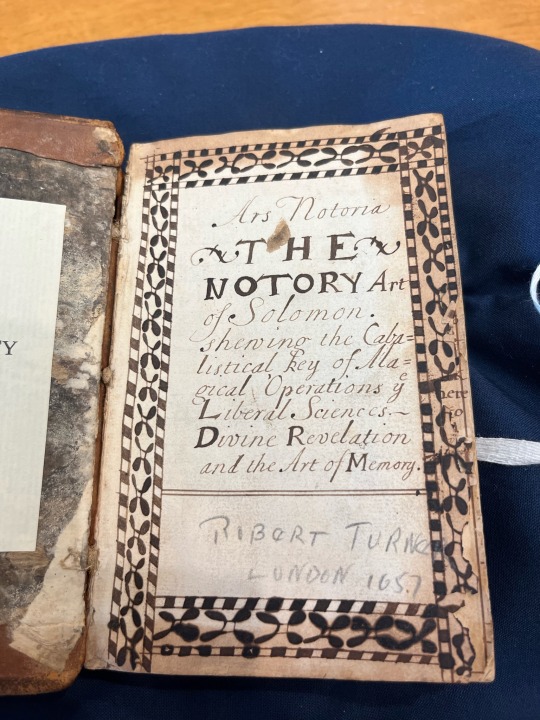
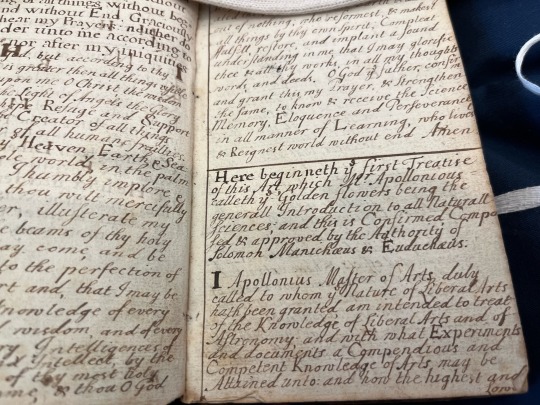

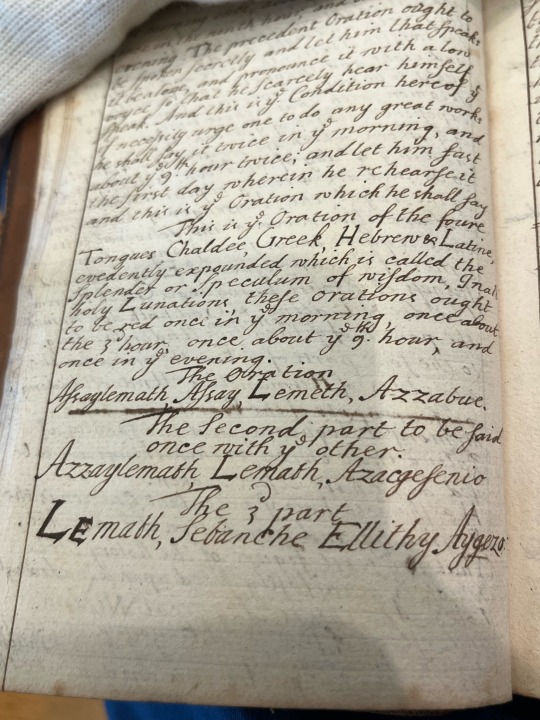

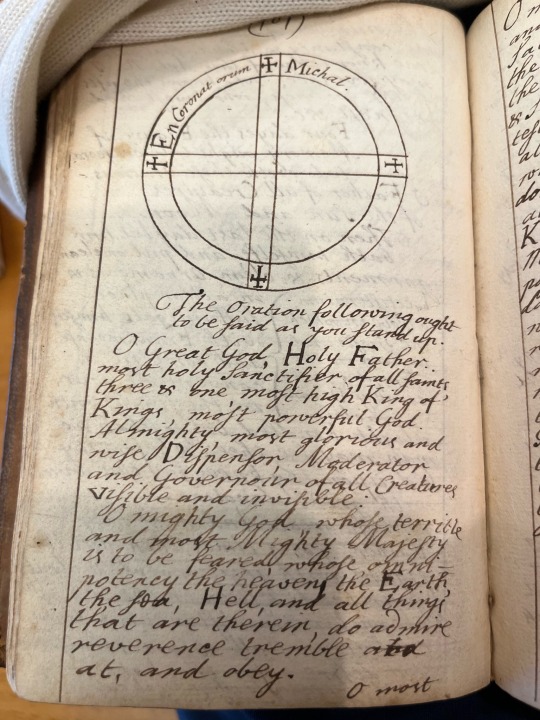
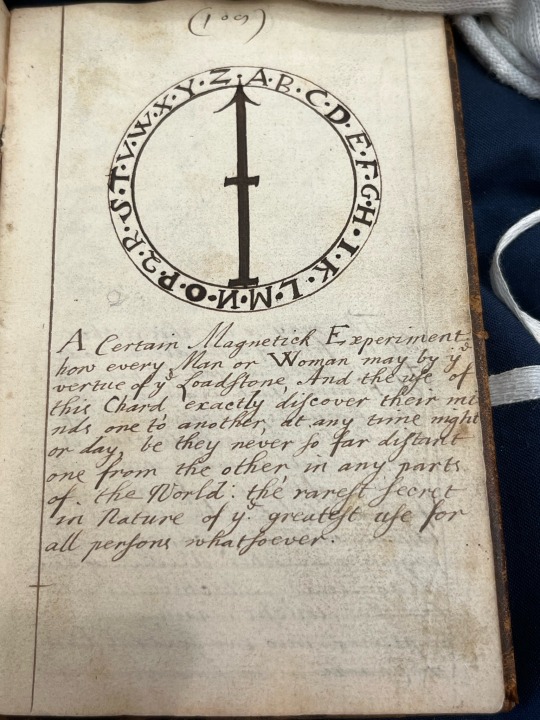
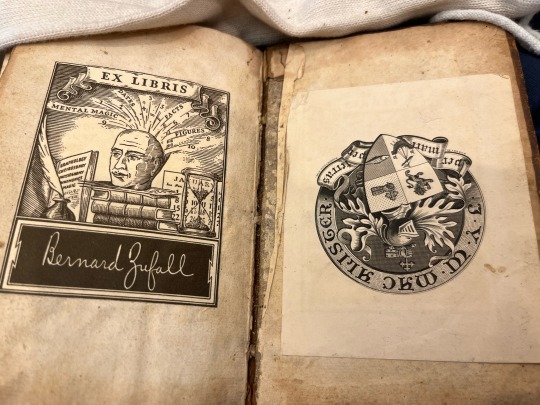
The Ars Notoria!
This is one of the grimoires of the Solomonic tradition of ceremonial magic. The Ars Notoria is technically part of the Lemegeton, but sometimes it’s treated as a separate text. I was expecting it to be in Latin, so I was pleasantly surprised to find that it was in English — very readable English, and in beautiful handwriting! It’s a translation of earlier Latin versions, but it has the feel of a personal Book of Shadows. A human wrote this. There are lines crossed off, words squeezed into the margins or added with little carrots.
This book is a great example of the fact that there’s a very fine line between a prayer and a spell. It mostly consists of a series of prayers and psalms, but it has some “voces magicae”-esque recitations of sacred names or multilingual incantations.
Did you know that hydromancy, pyromancy, and chiromancy count amongst the Liberal Arts? The Solomonic grimoires really make it clear how much magic is intertwined with the Liberal Arts (i.e. mathematics, philosophy, theology, grammar, rhetoric, astronomy, etc.). Many of the demons listed in the Ars Goetia teach these subjects (no wonder Faust was a scholar). The Ars Notoria says that you have to study certain liberal arts on specific days, just as you have to perform rituals on specific days and during specific planetary hours and so forth. And recite long mystical incantations before studying philosophy. Just like folk spells, these long prayers are supposed to have specific magical effects, like improving your memory and speech.
The Ars Notoria isn’t nearly as exciting as the Ars Goetia. I only found two magical figures in it. It took me way too long to realize that the mystical figures that surround the second one are, in fact, the alphabet. I guess that’s what you get when your grimoire is in English? Well no, actually. That figure actually demonstrates a handy spell that uses a magnetized needle (that’s what the symbol in the middle is meant to represent) to communicate with a friend at a long distance, using a method similar to an ouija board or one of those pendulum boards that you can get. As the needle turns, it spells out the message that your friend wants to send to you. Kind of interesting that this book includes a whole magical operation for something that we can do with our phones in an instant, and with much greater accuracy.
I looked up who Bernard Zufall was. Zufall was known for his ability to memorize anything, and had the largest collection of books dedicated to mnemonics, which was then donated to Yale University. He was more of a stage magician than a ceremonial magician. I’m not sure how or why he acquired an Ars Notoria, but I’m grateful that he did, because that means I get to see it.
#Ars Notoria#grimoire#manuscript#lesser key of solomon#solomonic magic#ceremonial magic#magic#occult#occultism#rare books#beinecke rare book and manuscript library#yale university
58 notes
·
View notes
Text
Tim Murphy at Mother Jones:
Arizona’s fourth legislative district, located in the suburban heart of Maricopa County, might be the ultimate bellwether in the ultimate bellwether state. And this fall, the stakes are impossibly high, not just at the presidential level—where polls show Donald Trump and Kamala Harris in a dead heat—but all the way down the ballot. Republicans control both chambers of the legislature by just one vote. In Arizona, where each legislative district elects two representatives, control of the state house could come down to Democrats’ efforts to flip one seat and hold another in this district that includes parts of Phoenix and Scottsdale.
In their quest to hold onto the legislature, Republicans have turned to a member of a famous Arizona family—Pamela Carter, older sister of the original Wonder Woman, Lynda Carter. On the campaign trail, the candidate Carter has talked up her work as a successful entrepreneur and a record of academic accomplishment, and boasts of having “my family’s full support” for her state house run. But a review of her record and past statements tells a much different story: In contrast to the fourth district’s moderate profile, Carter is a fervently anti-abortion minister who has been “blessed with end-time revelation” and who has made confusing claims about her past. And one notable member of her family is not on board—her famous sister, an advocate for reproductive rights.
“On her website, Pam claims to have her ‘family’s full support,'” Lynda Carter said in a statement to Mother Jones. “I have known Pam my entire life, which is why I sadly cannot endorse her for this or any public office.”
Pamela Carter has offered an inconsistent accounting of her educational background. Her page at Ballotpedia states that she “earned a master’s degree in Communications and Biblical studies and attended Arizona State University,” which a spokesperson for the elections site confirmed was based on an informational survey that was “verified by the candidate.” “I was raised in Scottsdale, went right here to Arcadia High, ASU, and I just love our city,” she said on a podcast in 2022. This is technically true. Carter did attend ASU, and she does also have a master’s degree. But the reality of her resume is a bit more complicated.
According to an ASU spokesperson, Carter was at one point enrolled at the university, but did not graduate. Instead, according to her LinkedIn page and other interviews, she attended an unspecified bible college in Kansas City, Missouri, and later received a master’s degree in “communications and media studies” from the Primus University of Theology, a Phoenix-based institution that affirms in its mission statement that “life begins at conception.” (One of the prerequisites for admission is that you order a copy of the founder’s book.) Primus, which aims to prepare its students “for their Ministry calling,” is not accredited by any agency recognized by the Department of Education. Instead, it cites the approval of the University Accreditation Association, which evaluates institutions on their adherence to “biblical truths.” Its degree programs are “designed for the specific and singular purpose of qualifying individuals for Christian Ministry.”
But Carter has also described that degree differently in different contexts. Her campaign website during her unsuccessful 2022 campaign for Scottsdale city council said she held a “Master’s Degree in Business and Communications,” a claim she also repeated that year in an interview on a local podcast. In another video that year, she boasted of having a “master’s degree in theology, as well as in mass communications.” A current campaign biography states that “I received my master’s degree in Communications and Biblical studies.”
Carter, who did not respond to requests for comment, has leaned into her biography during her run for office, arguing that her business experiences give her an advantage in the political realm. Foremost among those ventures was Jon Cole Systems, a gym she once owned with her ex-husband, the powerlifter Jon Cole. Newspaper ads for the fitness center sometimes featured Lynda Carter, touting the benefits of Cole’s “TOTAL WOMAN” workout program.
“It was the largest [gym] in the nation at the time,” Pamela Carter boasted in a 2022 interview, in which she suggested that working people struggling to find housing in Scottsdale needed to hustle as hard as she had when she owned two homes and was helping to run the business in the 1970s.
For a few years, the gym was a major success, with clients such as the Green Bay Packers and members of the Phoenix Suns. But it soon went downhill. The company pursued Chapter 11 bankruptcy in 1982, and was sold for $60,000 the next year, according to an Arizona Republic report in 1983. The couple divorced around the same time.
After the gym business fell through, Carter went on to a long career as a Christian wellness influencer, pitching the gospel alongside weight-loss and nutrition tips. She moved to California and hosted a fitness show called “Get in Shape with Pamela Carter” (on the Trinity Broadcasting Network) and another program on CBN called “Fit for Life.”
[...]
Carter was not just pitching products, though. She was selling a very particular kind of theology, rooted in a desire to see the United States “united for Jesus,” and a belief that modern-day prophets—like herself—were transmitting revelations from God. A biography at the ministry stated that Carter “is very passionate about her love for the Lord and has been blessed with end-time revelation of His desire for His bride.” (The full revelation was available for purchase for $25.) She talked frequently about building influence on the “Media mountain” and said in 2011 that she was part of “God’s media army…to be raised up for such a time as this, to take possession of the arts, the entertainment media, the internet.”
The term is often used by proponents of a Christian nationalist movement sometimes called the New Apostolic Reformation and a belief its adherents subscribe to known as Seven Mountains Dominionism, which aims to take gain influence over the seven spheres (or “mountains”) of government, education, media, family, entertainment, religion, and business.
In response to a candidate questionnaire from the city of Scottsdale two years ago, Carter said she had “been involved…as a volunteer” with three churches or organizations, all of which had ties to the NAR. They included Intercessors for America, a national prayer organization that warns that “there is an Enemy of our souls and our nation who orchestrates a coordinated battle plan that is discernible and beatable with spiritual weapons.”
Another group she touted her work with was the Kansas City-based International House of Prayer, whose founding pastor, Mike Bickle, was dismissed last year amid allegations of sexual abuse. The church, where worship services have run 24/7 since 1999, has “been criticized by some pastors for what they describe as unorthodox theology and a cultish atmosphere, charges that Mr. Bickle rejects,” the New York Times reported in 2011. (In response to a Kansas City Star investigation into Bickle earlier this year, the organization emphasized that his alleged abuse predated the church’s creation, while Bickle has admitted to “inappropriate behavior” but not “the more intense sexual activities that some are suggesting.”) Long before he was forced out, Bickle had courted controversy with his assertions from the pulpit that Oprah was a forerunner of the Antichrist and that God sent Hitler to kill Jewish people because they wouldn’t accept Christianity.
[...]
In that interview, Carter, who served that year as an advisor to the Trump campaign in the state, said she had acted as a prayer “intercessor” while working as a paid poll worker in Arizona. “I was dancing around, I had so much joy in just praying over every person that came in, you know, it was so fun,” she said. “But there’s also a lot of corruption I saw—not at the poll where I was working but at the election facility—and we just have to really watch and pray, watch and pray, and then you can cut that off in the spirit and then report it.”
[...]
The district offers a glimpse of how reproductive rights is playing at the ballot box in a highly competitive area. Christine Marsh, the district’s Democratic state senator, won her election in 2022 by a little more than 1,000 votes by relentlessly linking a Republican incumbent to the state legislature’s 15-week abortion ban. The current Republican state representative, Matt Gress, was one of three members of his party to break ranks and vote to repeal Arizona’s 1864 abortion ban, which offered no exceptions even for cases of rape. A recent Fox News survey found that supporters of an abortion-rights ballot initiative in Arizona outnumber opponents by roughly three-to-one—and 50-percent of Republicans said they approved. Carter, though, has sung a different tune.
Pamela Carter, the sister of Lynda Carter (who played Wonder Woman on the Wonder Woman show), is running for a State House seat in Arizona. Lynda is not backing her, citing Pamela’s anti-abortion views.
Read the full story at Mother Jones.
#Pamela Carter#Lynda Carter#Arizona#2024 Arizona Elections#2024 Elections#Arizona House of Representatives#Jon Cole#New Apostolic Reformation#Seven Mountains Dominionism#International House of Prayer#Mike Bick;e#Wonder Woman
7 notes
·
View notes
Note
You want to learn Arabic :0???? As an Arabian, Arabic is kinda hard but I feel like knowing it has helped me a LOT with learning languages like Spanish because the way you structure sentences is kinda similar :D like for example in Arabic if you want to say "can you give me it?" you'd say:
"يمديك تعطيني ايه؟"
And in Spanish you'd say:
"¿Puedes dámelo?"
In the Arabic sentence the word "تعطيني" is actually technically two words/pronouns put into one :0 it would translate into "(you) give me" تعطي-ني
is very similar to how in the Spanish one "dámelo" is also technically multiple pronouns/words put into one, dá-me-lo.
Spanish is still veryyy different than Arabic, it has WAY more tenses, In Arabic we have (about) the same amount of tenses as English. But you know, knowing Arabic helps a lot when learning other languages, I am very grateful to my Arabian heritage <3 I feel like of you know other languages like Spanish or Portuguese Arabic becomes way more easier to learn. although to be fair, I can see how the fact that Arabic has a whole different alphabet can make it really hard for foreigners, I've known the Arabic alphabet ever since I was 6 years old so I just kinda got used to it, Idk how it would be for a foreigner.
Side note: I've heard that people say that they Arabic sounds scary/harsh?? It's really funny to read new learners talking about how they started pissing their pants when their teachers said "السلام عليكم" but at the same time I can't help but wonder what DOES Arabic really sound like to foreigners??? Are we really that scary 😭 I promise I don't bite??
(Sorry for the huge rant, it just made me happy to see someone mention Arabic. I feel like it's only really brought up in religious discussions so it's kinda a jumpscare to see it brought up on this blog)
(Today I learned that the letter ت kinda looks like :] and it genuinely brightened up my day so I might as well share it here)
yeah!!! i've always wanted to learn arabic, and speaking hebrew, since they're both semitic languages, would probably help out with it, although i know they're still very different. ive been able to recognize words in the past though because there's so many shared roots and cognates.
and i think language learning always builds on itself, so you're totally right about languages like spanish and portuguese helping with other languages, especially for eng speakers since we don't get taught the terminology of language really and its structured very differently to a lot of other languages, particularly, like you mentioned, in terms of dropping pronouns and combining words.
and to me arabic has always sounded beautiful; i think people get caught up in very different sounds to their own (arabic having fricatives and glottal stops that english and many other european languages don't have, for instance) and also the general islamophobic/xenophobic/racist rhetoric around arabic makes a lot of people unable to recognize their biases and why they think arabic is scary but french sounds elegant, for example. but yeah it doesn't sound scary to me at all, just different!
it would also be nice to know arabic from a religious studies perspective but i was interested in learning it long before i started studying theology, so it's a combination of things! ive really enjoyed every islamic studies class ive taken and while im not muslim myself, being able to engage with islamic texts in arabic would be really cool.
9 notes
·
View notes
Note
I believe you said you were only interested in doing English because you wanted to teach English? I don't think you doing theology would limit you in that because at the end of the day I've had lots of tutors that have graduated in different disciplines, but they've shown to be able to work to that standard which is what got them the job. Why fight against what you're passionate about at the risk of not being able to scratch the itch you really want to scratch?
you make a good point! but the reason why i'm thinking of leaving is because theology is frequently myopic, patriarchal, and difficult to manoeuvre in as a critical theorist. aside from my professors with whom im very close and a couple of classmates i can't be openly queer, which is really taking more of a toll on me mentally than i ever thought it would! ive been discouraged from focusing on issues that i feel passionate about (domestic violence for instance- like literally told "you may not want to include x") so that i don't upset certain committees and so on. which is crazy and has been a real turn off. most of the work i have done has been not with theologians but with religious studies instructors who mostly work outside of the department (my supervisor, who i've worked with for three years, is a psychoanalyst, not a clergy member or theologian).
additionally the way my uni is set up i will get, literally 4-5x the amount of funding for a doctoral discipline that isn't theology, which because i am working class/disabled and do not have family support is a big deal.
there's also a handful of other things that im unsure are unique to my school or not, but which i'll share for the sake of anyone contemplating going into theology. until i was around ten years old i was raised following jewish law, so i am not baptized: my mom wanted me to choose whether i converted like the rest of our family did or not, so as an adult i am still not formally affiliated with any church (although my theological background is at an anglican college doing very jesuit-influenced theology). as a result of this there's almost like a summer camp mentality where different denominations vie to make you convert, which is fine and probably to be expected, but makes it extremely difficult to discern my desires and what the spirit (whatever you conceive him to be) wants me to do. as a theologian you are technically bound to follow the stipulations of whatever denomination you're associated with: for instance, a catholic theologian cannot technically criticize the pope because that would go against catholic theology, and an anglican theologian cannot openly state "the head of the church should be God, not the king" because that would go against anglican theology and also was what got thomas beckett killed.
for a number of reasons i think i am really burnt on in theology, and getting my doctorate in english was what i'd originally intended to do when i graduated in 2020. going into theology was pretty much a fluke decision and its served me incredibly well, but i like the idea of exploring other options too.
7 notes
·
View notes
Text
Finished my first week (I don't go in on Fridays) of Commute Listening! (Plus a day technically because I did have to go in last Saturday.)
Here's the summary of the undertaking so far...and of just how much car/public transit time I've logged:
Bach's Brandenburg Concertos 1-6 My beloveds--the only classical music that IS for sure on my faves list, because in the period when I had a CD player in my bedroom and about three CDs, these were two of them. Still not sure how well I could identify them, but I recognized them once they started playing and greatly enjoyed them.
Artifexian podcast ep 1. Interesting! All about worldbuilding. Just far enough removed from my own interests (yes I love fantasy, no I don't enjoy worldbuilding, it took me years to process that) that I can listen as, like, a spectator, but also listening to two people who do love worldbuilding makes me feel more positive about it. Like the energy.
Several Masses by Haydn (St. Cecilia, Mass in B flat, Mass in honor of the Blessed Virgin). Beautiful, obviously, but... did not grab me. Might just be that Masses and commuting are not the right combination. Might be my chant-inclined mind going "you're drawing out the words too much." Idk.
Art of Manliness ep 1, about Easy Company. INteresting and informative—a window into a subject I wouldn't have sought out on my own.
Out Alive ep 1. About a skier buried in an avalanche! Again, not something I would have sought out myself, but hearing the skier and the other people involved talk about the impact of a crisis situation and near-death experience, without any polish or dramatization... oof. Really interesting.
Reply All Billed as a "podcast about the internet," the first ep was about a social situation enabled by the internet. Also interesting as a window into someone else's personal experience that I don't think you'd quite get in any other medium than this unpolished interview format. This time about relationships instead of death, though.
In the Wind (album) by Peter, Paul and Mary. Branching aside from classical for some folk, since I was in the headspace for something between podcasts and instrumentals. Good! I recognized several of the songs but definitely not all. They also reminded me of several other country and folk artists I could listen to if I want to keep going down that road, in addition to listening to more of their work.
Vivaldi Concertos for Diverse Instruments GOOD. I loved these! They got stuck in my head afterward! Definitely want to try more Vivaldi. Also reinforcing my theory that any kind of music is good music if it involves violins going wild.
Mozart Violin Concertos 3-5 ALSO very very good. And I think I could hear the cleaner/plainer sound of Mozart as opposed to the baroque I'd just been listening to.
My Writing Sucks podcast ep 1, in which an author lovingly roasts her 14-year-old self's writing. Very fun. Endearing. Kinda makes me want to pull out my oldest, worst writing and approach it from an outside perspective, which I think would be Growth if my fragile ego could actually follow through on that. :P Maybe after a few more episodes of this.
Pints With Aquinas episode 1. This is an introductory episode giving background on Aquinas, as opposed to later episodes which will have more actual theology. Already good, though. Little harder for me to stay focused than some of the more fun ones, but I'll be coming back.
Classics for Kids Short and educational segment about classical music. Definitely told me things I don't know! A little short and a little flat in delivery for my needs, but good stuff.
Stuff You Missed in History Class ep 1. Interesting, but same issue as the above—it was just short. I need to check if episode length varies, and if they're all short I might load up six or so at once to give it a better trial. It was interesting but I couldn't get much flavor from one segment.
In conclusion, this project is definitely a success so far. I've been enjoying my commutes even when there's traffic, and I feel like I'm taking in things that I enjoy and are constructive in some way! It's fun for me. And I have a bunch of podcasts in store for next week that I haven't even touched yet.
25 notes
·
View notes
Text
in intra-christian arguments about LGBTQ+ issues i think there's always two main levels: 'what does the Bible say?' and 'what is our overarching narrative about queerness?', and i think a lot of resources that promote an affirming stance don't always take this into account.
by this distinction i mean that there's a difference between arguments like 'Leviticus 22.18 is about incest' and 'Know them by their fruits and the fruits of being non-affirming stink' - they're both biblically based, but one is defensively batting away clobber verses used as weapons, and the other is casting a broader narrative that gives queer affirmation some kind of weight.
conversely, for traditionalists, the difference is between something like 'Romans 1 says homosexuality is unnatural' and 'we all need to carry our crosses so suffering with suppressing your sexuality is noble and Christlike'. Again, both biblically based, but one serves to tell you what to do, and the other is the underpinning ideological justification.
(incidentally, i think it's quite frustrating that the anti-trans position in Christianity essentially relies on maybe one Bible verse we all ignore anyway by letting women wear pants, and is otherwise entirely dependent on having constructed an anti-trans narrative that is hardly the only or even obvious option for Christians)
so i think there are four quadrants to arguing for LGBTQ+ affirmation:
1) dismissing traditionalist readings of Scripture (e.g. 'Paul was only familiar with pederasty not committed adult homosexuality')
2) offering queer-affirming readings of Scripture (e.g. 'David and Jonathan were gay' or the Ethiopian eunuch)
3) Dismissing traditionalist narratives about why suppressing queerness is justifiable and good (e.g. 'carry your cross', 'gender complementarity', 'your identity is in Christ alone)
4) Constructing narratives about why queer affirmation is good (e.g. 'Know them by their fruits', 'Love is love', 'God created transsexuals the same reason he created wheat but not bread')
Now, I think a lot of arguments you see tend to focus on 1, 2, or 4.
Arguments for 1 I think often lack a lot of nuance and can honestly be quite bad, at least the passing ones you see online ("'homosexuality' as a term was added to the bible in the 1940s" is a huge oversimplification for starters, and i think the idea Leviticus is talking about pedophilia is confusing it with Paul's Epistles). But I think there are definitely good arguments out there, especially in books like Brownson's Bible Gender and Sexuality.
Arguments for 2 I think, to be honest, are often far too speculative and anachronistic to be helpful - we can certainly read David and Jonathan or the centurion and his slave etc queerly, but I think it goes too far to definitively project it back onto them for the sake of arguments. I think there's fruitful potential in reading things like Gentile inclusion in Acts queerly, or perhaps even, idk, the Book of Job. But these are easily the most spurious and least helpful arguments (which is not to say the Bible can't be interpreted pro-queerly; just that that comes out more in #4 in constructing pro-queer narratives).
Arguments for 4, I think, are actually quite powerful because they provide the underlying engine of actually wanting to be affirming. It's all well and good to argue dry technical points of ancient Hebrew or Greek exegesis, but if there's otherwise no compelling moral issue at stake - oppression of LGBTQ people, rejection of love, the risk of being locked into legalistic thinking, even just alienation from your LGBTQ+ loved ones - why would anyone care?
BUT on the other hand, they can also lapse into cliche and feel like arguments from emotion when they get prioritised over arguments about the actual text/theology. Which is frustrating, because in a sense these arguments are 'more important' - what's going to keep you committed to an affirming position long term, a realisation that the meaning of 'arsenokoites' in 1 Corinthians is ambiguous, or wholeheartedly believing non-affirming theology is ripe with bad and harmful fruits?
Finally, arguments for 3, I think, are relatively lacking. Arguments constructing pro-queer narratives implicitly counter anti-queer ones, obviously, and I think a bit of work has been done around dismantling gender complementarity (albeit not always in the context of LGBTQ+ issues) and the whole 'my identity is in Christ' (probably thanks to the Side B community tbh).
But I feel like there are other narratives that have gone not really explicitly addressed, like 'we all carry our crosses', 'Christians are called to be in the world and not of it; LGBTQ+ inclusion is a secular whim'. And I think these especially are narratives that we progressives are inclined to just dismiss out of hand, because they just feel inherently culty and authoritarian; they don't start from a place of good faith, the assumptions are faulty, let's not bother.
But I think it would be worth picking these apart further for the sake of people stuck in homophobic churches - fruitfully deconstructing what 'carrying your cross' means and the role of suffering in the Christian life, or clearly identifying where LGBTQ+ affirmation comes from within Christian theology, or working out why it's not a problem the secular world took the lead on this (because the Holy Spirit is working throughout history and is not so weak as to be limited to the church, because the church's role isn't necessarily been to be the only arbiters of moral progress, because religious institutions becoming corrupt and losing sight of justice is not a new concept to Christians etc)
9 notes
·
View notes
Note
Greetings, I'm a god from another... What do you call it here... Universe? I don't intend to cause any harm but I am a god of freedom. Well, technically my domain is simply "Keys" but what is more free than being able to open anything you like and go anywhere you want? But I guess that's the problem isn't it. I'd been using your world as a... Let's say... Pathway and Safehouse for a while now between killing various other gods who don't believe in freedom the way I do. But a mortal colleague of mine hinted that I should have informed you about my activities within your world even if I don't use my divine powers here. I don't like being forced to do anything, but I do enjoy the relative peace this world has compared to my own.
Please advise,
-A Very Tricky Fox
We observe a strict policy of neutrality when it comes to conflict between theo-planar pistiphagic entities of any kind. You won’t find help or allies here.
That being said, introducing yourself goes a long way. I’d advise you to register with the Holistic Theology agency, if only for us to have your name (if it can be spoken or written) on a piece of paper.
You never have a second chance to make a good first impression.
21 notes
·
View notes
Text
D' Pope, K. Barth, & an Ojibwa Chieftain

Pope Francis was on top of the headlines the past days due to this controversial remark he made in his visit to Singapore.
Social media erupted with a loud chorus of 'heresy!' especially from the more conservative wing of Christianity as an expression of their deep cause of concern (or disagreement) with the Pope's perspective. In fairness, the pope didn't specify whether the paths he has in mind are humanity's best attempts to make sense of God or was it paths that are of divine origin (the technical term in theology is God's own self-revelation). That is a critical point to consider in the debate about exclusivism, inclusivism, and pluralism.
A more interesting possible response to what the Pope said can be found in this anecdote:
Karl Barth was lecturing to a group of students at Princeton. One student asked the German theologian "Sir, don’t you think that God has revealed himself in other religions and not only in Christianity?" Barth’s answer stunned the crowd.
With a modest thunder he answered, "No, God has not revealed himself in any religion, including Christianity. He has revealed himself in His Son."
Yes, Jesus is God's most vivid expression of who He is and what He is like as per the testimony of the Christian Scriptures:
“Jesus is the image of the invisible God...” -Colossians 1:15 (NCV)
“The Son reflects the glory of God and shows exactly what God is like.” -Hebrews 1:3 (NCV)
Still yet, one has to ask the ways Jesus has manifested himself and continues to do so in other peopleS, other places, and peculiar points of contact? Consider for example the numerous stories of supernatural encounters with Jesus which serves as the bedrock of why Iran today has one of the fastest growing number of Christians despite a strict ban to proliferation and display of the Bible.
Pushing the envelope further, what is more interesting for me is how Barth's pointed remark can be taken even further in the realm of decolonial theologizing. Consider for example another story, one retold by Randy Woodley, an indigenous Cherokee theologian, about a conversation he had with much respected elder from the Ojibwa tribe:
“You know, my uncle told me to 'never disrespect Jesus, because Jesus is a great spirit and I talk to him.' And he would go on and he’d tell us more and more, and then he would say this thing about his uncle again...
We sat there for maybe two hours, and at least six or seven times he said this thing about his uncle and respecting Jesus. Then at one point he said, “My uncle trained most of the spiritual leaders around this area. He lived to be over a hundred years old, and my uncle would tell me all these stories about Jesus. So I asked my uncle one time, I said, ‘Uncle, how do you know all this about Jesus? Did you go to residential school?’ He said, ‘Oh no! No! I never did that.’ Then I asked him, ‘Did the priest teach you?’ And he says, ‘No, I have never been to church.’ Then I said, ‘But you tell me all the stuff about Jesus. Have you been reading the Bible?’ My uncle said, ‘No, just remember what I told you in the past: don’t disrespect Jesus ’cause he’s a great spirit, and I talk to him.’ I said to my uncle, ‘Well yeah, you talk to him, but how do you know all these things he’s done?’ You know my uncle looked at me so quizzically, and then he said, ‘Well, when I talk to him, of course he talks back.’ And then the elder said, ‘I’m going to pray for you now,’ and then our time was over.”
...If you understood the story I just told about the visit with this elder, you understand my message, because it holds the core of it."*
What is clear here is that those who have no idea about how these points of 'contact' can transpire are better off taking a listening and learning posture rather than a judging and dismissive stance.
-Rants by Rei Lemuel Crizaldo (September 16, 2024)
*Note: quoted from R. Woodley, Indigenous Theology and the Western Worldview (Baker, 2022)
2 notes
·
View notes